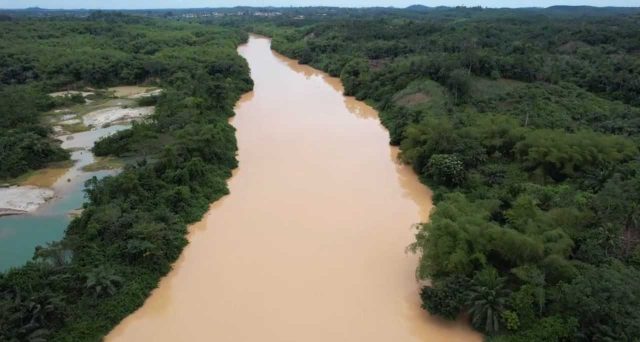Gold mining is vital to Ghana’s socioeconomic development, contributing significantly through tax revenues, corporate social responsibility, and employment.
As one of the world’s leading gold producers, Ghana’s mining industry is primarily driven by two sectors: Large-scale mining (LSM) and artisanal small-scale mining (ASM). Despite both sectors requiring official licenses, illegal and unregulated mining, known as galamsey, has emerged.
Galamsey has deep historical roots, tracing back to pre-colonial times when informal gold mining sustained many rural communities, particularly in gold-rich regions like Ashanti and Western Ghana.
The practice gained significant attention in the 1980s with the liberalization of the mining sector under structural adjustment programs. In 1989, Ghana enacted the Small-Scale Mining Law (PNDCL 218), which aimed to formalize artisanal mining by offering licenses and regulations.
However, many miners continued to operate without licenses due to bureaucratic hurdles and the high cost of formalization, leading to a surge in illegal galamsey operations. Rising poverty and unemployment further exacerbate the issue, pushing the poor and jobless toward galamsey as a means of survival.
For many, galamsey is perceived as a quick route to wealth, with reports indicating that even affluent individuals are involved. Politicians, law enforcement officers, and local authorities have also been implicated, accused of providing protection to illegal miners, accepting bribes, and even owning mining concessions.
While galamsey became a national concern in the 2000s, it has drawn even greater attention in the past decade due to its escalating environmental damage. It has severely degraded water bodies, destroyed forests, ruined agricultural lands, and contaminated soils with harmful chemicals used in gold extraction.
The situation worsened with the involvement of foreign nationals, particularly Chinese miners, who introduced mechanized techniques that intensified environmental degradation. This foreign involvement has sparked tensions with local miners, who view gold mining as part of their traditional livelihood. Moreover, lives have been lost due to the dangerous and unregulated nature of illegal mining activities, with even state officials falling victim to violence and conflict related to galamsey.
In response to the crisis, several committees have been established by successive governments in recent years. In 2013, under President John Dramani Mahama, the Inter-Ministerial Task Force on Illegal Mining was established to improve coordination among ministries and agencies in combating the problem.
In 2017, President Nana Addo Dankwa Akufo-Addo created the Inter-Ministerial Committee on Illegal Mining, which launched the military-led Operation Vanguard intervention. In 2021, the National Consultative Dialogue on Small-Scale Mining convened stakeholders, including traditional leaders and civil society organizations, to discuss sustainable solutions.
Despite these initiatives, galamsey remains a persistent issue in Ghana due to socioeconomic, political, and enforcement challenges. It is believed that recommendations from various committees have not been fully implemented; if they had, the crisis may not have escalated to its current level. Many strongly believe that partisan politics and deep connections between influential figures and illegal mining complicate enforcement and undermine government efforts.
As illegal mining surges to unprecedented levels, it requires urgent collective action that transcends partisan politics. The persistent failure to effectively tackle the crisis underscores that simply forming more committees is not the solution. There is little to no point in creating more committees if their recommendations are not implemented proactively to tackle the problem. It is essential to address this issue seriously and pursue sustainable, long-term solutions.
Successful examples from other countries, such as Brazil and Peru, offer valuable lessons. Brazil’s 2019 “Operation Green Brazil,” a military-led effort, significantly reduced illegal mining in the Amazon. Peru’s “Operation Mercury” dismantled illegal camps and restored degraded areas while formalizing miners with incentives. Both efforts included law enforcement, environmental restoration, and formalization.
Similarly, countries like Colombia, Mongolia, and the Philippines have implemented formalization programs with environmental guidelines and licensing, leading to reduced illegal mining and the adoption of sustainable practices.
In Ghana, consistent and well-coordinated law enforcement efforts, akin to Brazil’s and Peru’s operations, could effectively address illegal mining. Providing incentives for artisanal miners to formalize their activities, such as streamlined licensing processes and training on sustainable practices, as seen in Colombia and Mongolia, could help mitigate illegal mining.
Furthermore, post-intervention rehabilitation efforts, including environmental restoration, should be part of a long-term strategy. Introducing sustainable livelihood options, such as investments in agriculture, agroforestry, and vocational training, is essential, especially in regions where galamsey is commonplace. These initiatives should be coupled with efforts to reduce unemployment, as many individuals turn to galamsey for economic survival.
If the galamsey crisis cannot be effectively addressed by the government alone, it is crucial to collaborate with other countries that have successfully tackled similar issues or partner with international agencies. Implementing these strategies must be backed by strong political will and accountability.
By tailoring these approaches to Ghana’s local context, the country can make significant strides in curbing galamsey while promoting sustainable mining practices. A holistic approach is vital—one that not only targets illegal mining activities but also addresses the root causes and broader (ecological) consequences of the practice. Ultimately, considering a ban on galamsey operations may be necessary to protect the environment and public welfare.
By Gervin A Apatinga










![Mr Logic signs two dancehall artistes unto his Red Panther record label [Video]](https://ghananewss.com/storage/2023/05/Mr-Logic-signs--100x75.jpeg)







